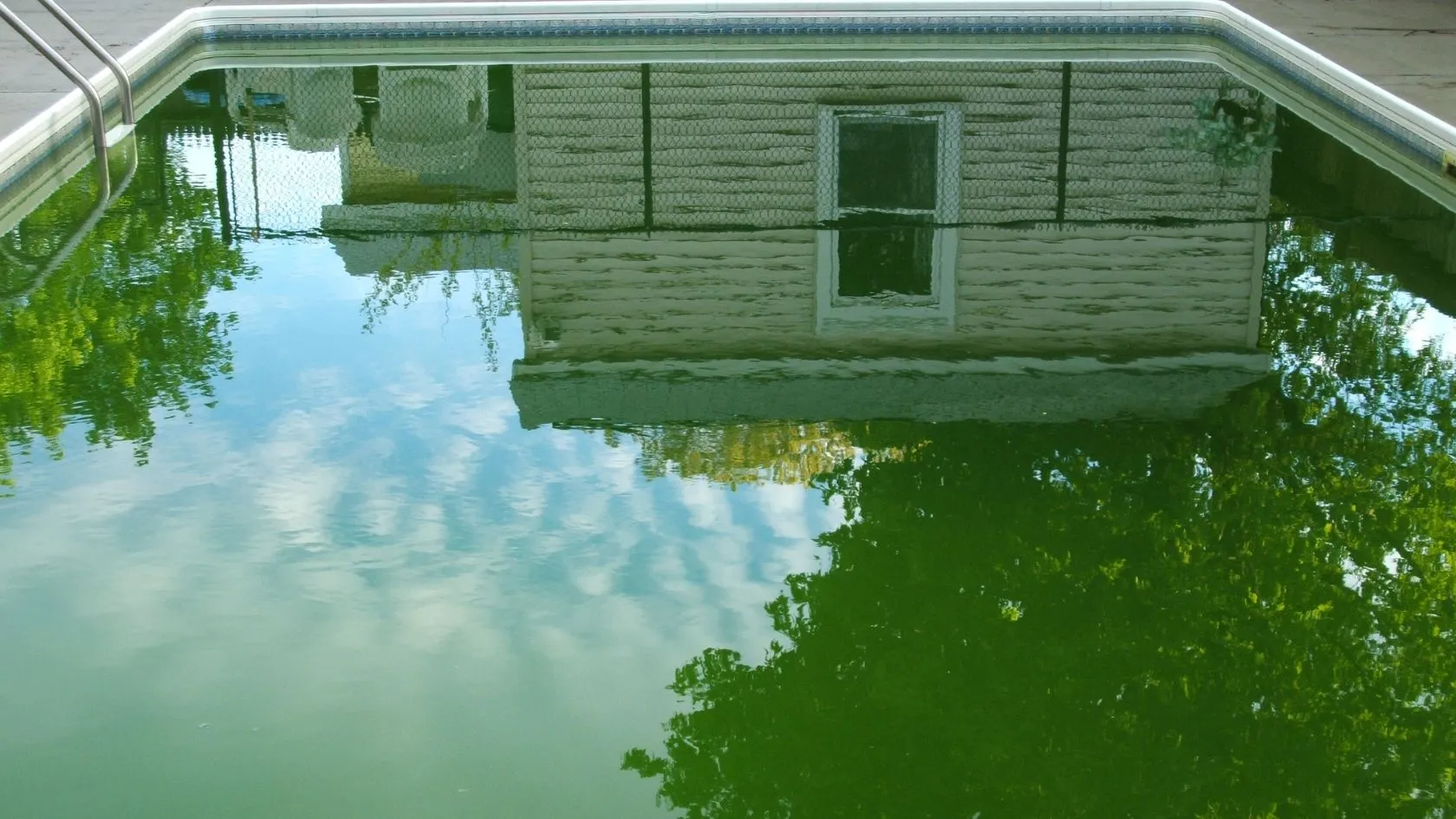We get it—closing the pool means summer is officially over. It’s tempting to stretch the season a little longer, especially when the weather still feels warm during the day. But waiting too long to close your pool can come with some frustrating consequences.
Even if your water looks clear and you’re not using the pool much anymore, environmental factors like falling leaves, rain, colder nights, and shifting water chemistry can start to cause problems—sometimes before you even notice them.
If you’re on the fence about when to close, here’s what can happen if you wait too long—and how to prevent headaches before spring.

1. Algae Growth Can Take Over (Even in Cooler Water)
Algae doesn’t just grow in the heat of summer. Once your sanitizer level drops and organic material builds up, it doesn’t take much for algae to bloom, especially during warm fall days or after a rainstorm.
The longer you wait to close, the more opportunity algae has to form and settle into the water, walls, and steps. By spring, that small bloom can turn into a full-on green mess.
What to do:
If you’re not closing right away, remember that it's very important to run your pool every day until closing and stay on top of your sanitizer level. Continue brushing and skimming regularly. Use an algae prevention product or continue your weekly maintenance routine.
Product tip:
E-Z POOL® contains built-in algae control, helping reduce the risk even if you extend your swim season.
2. Leaves and Debris Create a Perfect Storm
As trees start to drop leaves, your pool becomes a magnet for debris—especially if it’s not covered. Decaying leaves, pine needles, pollen, and dirt introduce phosphates, organic waste, and metals that can:
- Feed algae
- Stain surfaces
- Clog filters and skimmer baskets
- Throw off water balance
If leaves sit too long, they can even cause permanent discoloration to liners and plaster.
What to do:
- Skim and vacuum more frequently if your pool is uncovered
- Run your filter longer to keep up with increased load
- Treat the water with a phosphate and metal remover before closing
Product tip:
Revive!® START UP/CLEAN UP helps remove metals, phosphates, and organic debris in one treatment. It’s especially helpful before closing in leafy yards.
3. Cooler Nights Can Throw Off Water Chemistry
As fall weather sets in, daily temperature swings get wider. Warm days and chilly nights can destabilize water chemistry, especially pH and calcium hardness. Combined with less regular testing, this can lead to scaling, corrosion, or sanitizer inefficiency.
What to do:
Don’t assume cooler weather means less maintenance. Keep testing pH, alkalinity, and calcium hardness weekly until you close. Adjust as needed to avoid staining or surface damage over the winter.
Product tip:
If you’re using E-Z POOL®, you’re already supporting balanced pH and calcium control with every dose.
4. Waterline Scum and Organic Buildup Settle In
With fewer swimmers and cooler temperatures, you might ease up on brushing and skimming. But oils, lotions, and environmental organics are still present—and they settle onto the waterline and surfaces if left untreated.
That means when you remove the cover in spring, you may be greeted by sticky buildup or unsightly scum lines.
What to do:
Treat the water with a broad-spectrum enzyme product before closing. It will continue breaking down organics under the cover, reducing mess and improving water clarity at opening.
Product tip:
If you’re using ENZymePRO® is an ideal pre-closing treatment for this reason. It works with your existing sanitizer to keep water cleaner while the pool is dormant.
5. Spring Opening Will Be Harder (and More Expensive)
Waiting too long to close increases the chances that you’ll need more chemicals, more time, and more effort to get the pool ready next year. Whether it’s algae, scale, stains, or poor filtration, the longer you wait, the harder the recovery.
What to do:
Close when your water is still relatively clean and balanced—not after it’s already started to decline.
If you’re not ready to close this week, use the time wisely to prep the water and stay consistent with care.
Final Thoughts on Waiting to Close Your Pool
Delaying your pool closing by a week or two won’t always cause problems, but pushing it too far into the season can undo a lot of the work you’ve done all year.
If you're still enjoying occasional swims, make a plan now to manage chemistry, debris, and sanitization. If you're ready to close soon, treat your water properly and close clean.
The better your water is going into the off-season, the easier—and faster—your opening will be next year.
